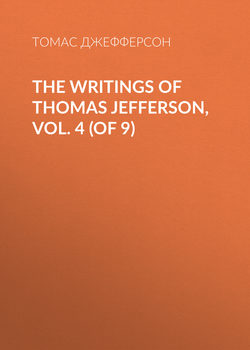Читать книгу The Writings of Thomas Jefferson, Vol. 4 (of 9) - Томас Джефферсон, Thomas Jefferson - Страница 18
TO J. MADISON
ОглавлениеSeptember 1, 1793.
Sir,—My last was of the 25th, since that I have received yours of the 20th, and Col. M's of the 21st. Nothing further has passed with Mr. Genet, but one of his consuls has committed a pretty serious deed at Boston, by going with an armed force taken from a French frigate in the harbor, and rescuing a vessel out of the hands of the marshal who had arrested her by process from a court of justice; in another instance he kept off the marshal by an armed force from serving a process on a vessel. He is ordered, consequently, to be arrested himself, prosecuted and punished for the rescue, and his exequatur will be revoked. You will see in the newspapers the attack made on our commerce by the British king in his additional instruction of June 8. Though we have only newspaper information of it, provisional instructions are going to Mr. Pinckney to require a revocation of them, and indemnification for all losses which individuals may sustain by them in the meantime. Of the revocation I have not the least expectation. I shall therefore be for laying the whole business (respecting both nations) before Congress. While I think it impossible they should not approve of what has been done disagreeable to the friendly nation, it will be in their power to soothe them by strong commercial retaliation against the hostile one. Pinching their commerce will be just against themselves, advantageous to us, and conciliatory towards our friends of the hard necessities into which their agent has drawn us. His conduct has given room for the enemies of liberty and of France, to come forward in a state of acrimony against that nation, which they never would have dared to have done. The disapprobation of the agent mingles with the reprehension of his nation, and gives a toleration to that which it never had before. He has still some defenders in Freneau, and Greenlief's paper, and who they are I know not: for even Hutcheson and Dallas give him up. I enclose you a Boston paper, which will give you a specimen of what all the papers are now filled with. You will recognize Mr. A– under the signature of Camillus. He writes in every week's paper, and generally under different names. This is the first in which he has omitted some furious incartade against me. Hutcheson says that Genet has totally overturned the republican interest in Philadelphia. However, the people going right themselves, if they always see their republican advocates with them, an accidental meeting with the monocrats will not be a coalescence. You will see much said, and again said, about G.'s threat to appeal to the people. I can assure you it is a fact. I received yesterday the MS. you mentioned to me from F–n. I have only got a dozen pages into it, and never was more charmed with anything. Profound arguments presented in the simplest point of view entitle him really to his ancient signature. In the papers received from you, I have seen nothing which ought to be changed, except a part of one sentence not necessary for its object, and running foul of something of which you were not apprized. A malignant fever has been generated in the filth of Water street, which gives great alarm. About 70 people had died of it two days ago, and as many more were ill of it. It has now got into most parts of the city, and is considerably infectious. At first 3 out of 4 died, now about 1 out of 3. It comes on with a pain in the head, sick stomach, then a little chill, fever, black vomiting and stools, and death from the 2d to the 8th day. Everybody who can, is flying from the city, and the panic of the country people is likely to add famine to disease. Though becoming less mortal, it is still spreading, and the heat of the weather is very unpropitious. I have withdrawn my daughter from the city, but am obliged to go to it every day myself. My threshing machine has arrived at New York. Mr. Pinckney writes me word that the original from which this model is copied, threshes 150 bushels of wheat in 8 hours, with 6 horses and 5 men. It may be moved either by water or horses. Fortunately the workman who made it (a millwright) is come in the same vessel to settle in America. I have written to persuade him to go on immediately to Richmond, offering him the use of my model to exhibit, and to give him letters to get him into immediate employ in making them. I expect an answer before I write to you again. I understand that the model is made mostly in brass, and in the simple form in which it was first ordered, to be worked by horses. It was to have cost 5 guineas, but Mr. Pinckney having afterwards directed it to be accommodated to water movement also, it has made it more complicated, and costs 13 guineas. It will thresh any grain from the Windsor bean down to the smallest. Adieu.
